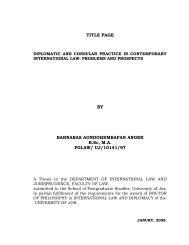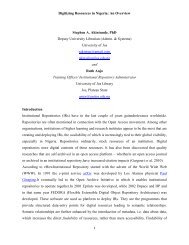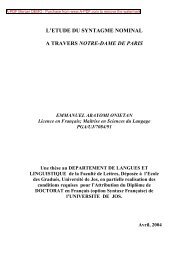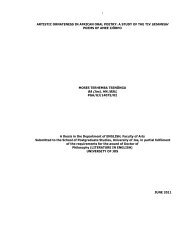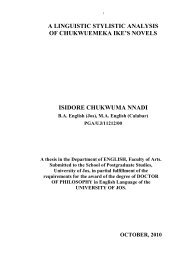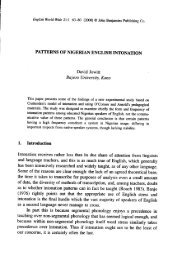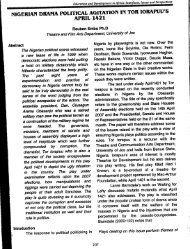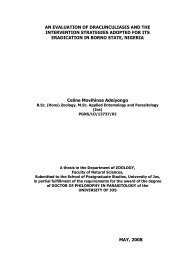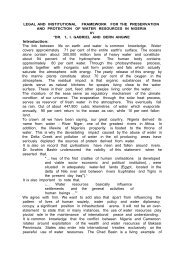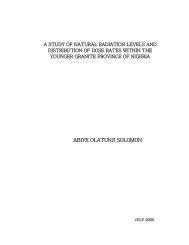Professor Atiene Solomon Sagay - University of Jos Institutional ...
Professor Atiene Solomon Sagay - University of Jos Institutional ...
Professor Atiene Solomon Sagay - University of Jos Institutional ...
Create successful ePaper yourself
Turn your PDF publications into a flip-book with our unique Google optimized e-Paper software.
References<br />
Too many mothers and newborns are dying in Nigeria. We know what needs to be done<br />
to save these lives. The real challenges are how to deliver services and scale up interventions,<br />
particularly to those who are vulnerable, hard to reach, marginalized and<br />
excluded. Innovative, non-governmental ways <strong>of</strong> reactivating, supervising and<br />
monitoring services in primary healthcare centres across Nigeria should be a top<br />
priority.<br />
The HIV epidemic is an emerging threat to maternal and newborn lives. Existing<br />
prevention and treatment interventions are efficacious but must be scaled up to<br />
achieve the desired impact.<br />
In Nigeria, the HIV epidemic is driven by heterosexual transmission. In heterosexual<br />
settings, HIV does not stand alone. It requires the support <strong>of</strong> other STDs to stand. This<br />
is why most societies with STD control programs are not at risk <strong>of</strong> a heterosexual<br />
HIV epidemic. In addition to existing HIV interventions, resuscitation <strong>of</strong> STD control<br />
programs nationally is required to control the present HIV scourge.<br />
1. <strong>Sagay</strong> AS, Udoeyop EU, Pam IC, Karshima JA, Daru PH, Otubu J.A.M.<br />
Laparoscopic Evaluation <strong>of</strong> 1000 Consecutive Infertile Women in <strong>Jos</strong>, Nigeria.<br />
Tropical Journal <strong>of</strong> Obstetrics and Gynaecology. 1998, 15(1):30-35.<br />
2. Imade G.E. <strong>Sagay</strong> A.S., Pam I.C., Daru P.H. Semen Quality <strong>of</strong> Male Partners <strong>of</strong><br />
Infertile Couples in <strong>Jos</strong>, Nigeria. Tropical Journal <strong>of</strong> Obstetrics and Gynaecology.<br />
2000, 17(1):24-26.<br />
3. Hollos M, Larsen U, Obono O, Whitehouse B. The problem <strong>of</strong> infertility in high<br />
fertility populations: meanings, consequences and coping mechanisms in two<br />
Nigerian communities. Soc Sci Med. 2009 Jun; 68(11):2061-8.<br />
4. Friday E. Okon<strong>of</strong>ua, Diana Harris, Adetanwa Odebiyi, Thomas Kane and Rachel<br />
C. Snow The social meaning <strong>of</strong> infertility in Southwest Nigeria Health Transition<br />
Review 7, 1997, 205-220.<br />
5. Aghanwa HS, Dare FO, Ogunniyi SO. Sociodemographic factors in mental disorders<br />
associated with infertility in Nigeria. Psychosom Res. 1999 Feb; 46(2):117-23.<br />
6. Guttmacher Institute. In Brief; Reducing unsafe abortion in Nigeria, 2008 Series,<br />
No.3 Pp: 1-4.<br />
7. Bankole A, Oye-Adeniran BA, Singh S, Adewole I, Wulf D, Sedgh G,Hussain R.<br />
Unwanted Pregnancy and Induced Abortion in Nigeria: Causes and Consequences,<br />
New York: Guttmacher Institute, 2006<br />
8. World Health Organization (WHO), Maternal Mortality in 2005: Estimates<br />
Developed by WHO, UNICEF, UNFPA and the World Bank, Geneva: WHO, 2007.<br />
26



